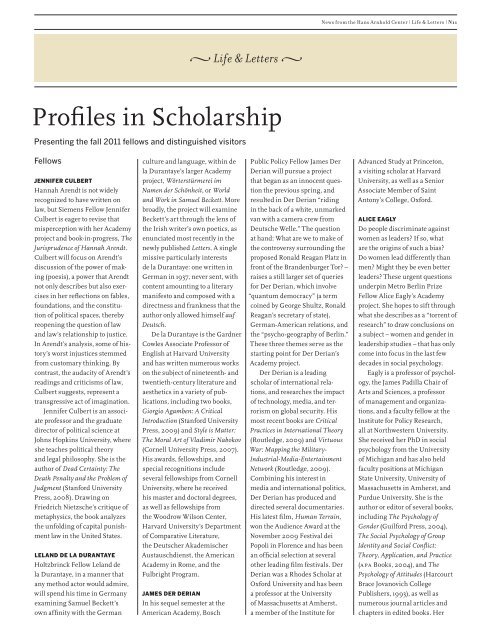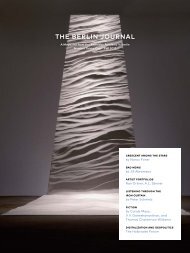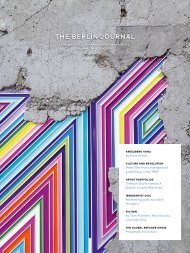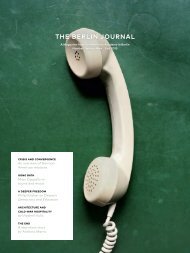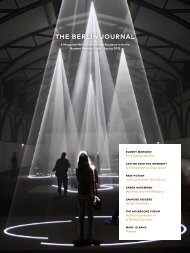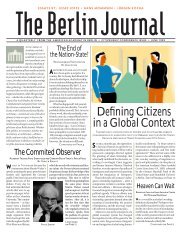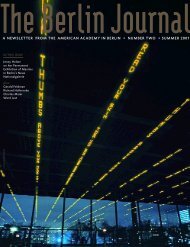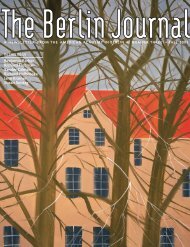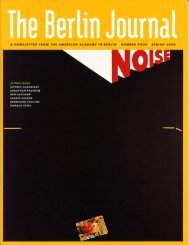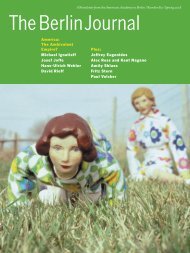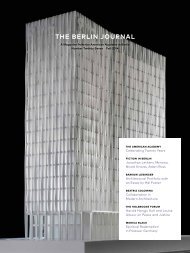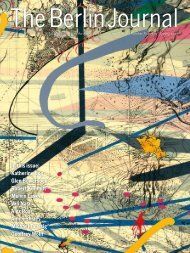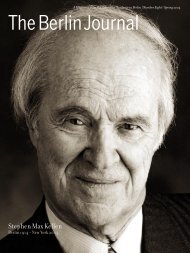Fall 2011 | Issue 21
- No tags were found...
You also want an ePaper? Increase the reach of your titles
YUMPU automatically turns print PDFs into web optimized ePapers that Google loves.
News from the Hans Arnhold Center | Life & Letters | N11<br />
• Life & Letters •<br />
Profiles in Scholarship<br />
Presenting the fall <strong>2011</strong> fellows and distinguished visitors<br />
Fellows<br />
JENNIFER CULBERT<br />
Hannah Arendt is not widely<br />
recognized to have written on<br />
law, but Siemens Fellow Jennifer<br />
Culbert is eager to revise that<br />
misperception with her Academy<br />
project and book-in-progress, The<br />
Jurisprudence of Hannah Arendt.<br />
Culbert will focus on Arendt’s<br />
discussion of the power of making<br />
(poesis), a power that Arendt<br />
not only describes but also exercises<br />
in her reflections on fables,<br />
foundations, and the constitution<br />
of political spaces, thereby<br />
reopening the question of law<br />
and law’s relationship to justice.<br />
In Arendt’s analysis, some of history’s<br />
worst injustices stemmed<br />
from customary thinking. By<br />
contrast, the audacity of Arendt’s<br />
readings and criticisms of law,<br />
Culbert suggests, represent a<br />
transgressive act of imagination.<br />
Jennifer Culbert is an associate<br />
professor and the graduate<br />
director of political science at<br />
Johns Hopkins University, where<br />
she teaches political theory<br />
and legal philosophy. She is the<br />
author of Dead Certainty: The<br />
Death Penalty and the Problem of<br />
Judgment (Stanford University<br />
Press, 2008). Drawing on<br />
Friedrich Nietzsche’s critique of<br />
metaphysics, the book analyzes<br />
the unfolding of capital punishment<br />
law in the United States.<br />
LELAND DE LA DURANTAYE<br />
Holtzbrinck Fellow Leland de<br />
la Durantaye, in a manner that<br />
any method actor would admire,<br />
will spend his time in Germany<br />
examining Samuel Beckett’s<br />
own affinity with the German<br />
culture and language, within de<br />
la Durantaye’s larger Academy<br />
project, Wörterstürmerei im<br />
Namen der Schönheit, or World<br />
and Work in Samuel Beckett. More<br />
broadly, the project will examine<br />
Beckett’s art through the lens of<br />
the Irish writer’s own poetics, as<br />
enunciated most recently in the<br />
newly published Letters. A single<br />
missive particularly interests<br />
de la Durantaye: one written in<br />
German in 1937, never sent, with<br />
content amounting to a literary<br />
manifesto and composed with a<br />
directness and frankness that the<br />
author only allowed himself auf<br />
Deutsch.<br />
De la Durantaye is the Gardner<br />
Cowles Associate Professor of<br />
English at Harvard University<br />
and has written numerous works<br />
on the subject of nineteenth- and<br />
twentieth-century literature and<br />
aesthetics in a variety of publications,<br />
including two books,<br />
Giorgio Agamben: A Critical<br />
Introduction (Stanford University<br />
Press, 2009) and Style is Matter:<br />
The Moral Art of Vladimir Nabokov<br />
(Cornell University Press, 2007).<br />
His awards, fellowships, and<br />
special recognitions include<br />
several fellowships from Cornell<br />
University, where he received<br />
his master and doctoral degrees,<br />
as well as fellowships from<br />
the Woodrow Wilson Center,<br />
Harvard University’s Department<br />
of Comparative Literature,<br />
the Deutscher Akademischer<br />
Austauschdienst, the American<br />
Academy in Rome, and the<br />
Fulbright Program.<br />
JAMES DER DERIAN<br />
In his sequel semester at the<br />
American Academy, Bosch<br />
Public Policy Fellow James Der<br />
Derian will pursue a project<br />
that began as an innocent question<br />
the previous spring, and<br />
resulted in Der Derian “riding<br />
in the back of a white, unmarked<br />
van with a camera crew from<br />
Deutsche Welle.” The question<br />
at hand: What are we to make of<br />
the controversy surrounding the<br />
proposed Ronald Reagan Platz in<br />
front of the Brandenburger Tor? –<br />
raises a still larger set of queries<br />
for Der Derian, which involve<br />
“quantum democracy” (a term<br />
coined by George Shultz, Ronald<br />
Reagan’s secretary of state),<br />
German-American relations, and<br />
the “psycho-geography of Berlin.”<br />
These three themes serve as the<br />
starting point for Der Derian’s<br />
Academy project.<br />
Der Derian is a leading<br />
scholar of international relations,<br />
and researches the impact<br />
of technology, media, and terrorism<br />
on global security. His<br />
most recent books are Critical<br />
Practices in International Theory<br />
(Routledge, 2009) and Virtuous<br />
War: Mapping the Military-<br />
Industrial-Media-Entertainment<br />
Network (Routledge, 2009).<br />
Combining his interest in<br />
media and international politics,<br />
Der Derian has produced and<br />
directed several documentaries.<br />
His latest film, Human Terrain,<br />
won the Audience Award at the<br />
November 2009 Festival dei<br />
Popoli in Florence and has been<br />
an official selection at several<br />
other leading film festivals. Der<br />
Derian was a Rhodes Scholar at<br />
Oxford University and has been<br />
a professor at the University<br />
of Massachusetts at Amherst,<br />
a member of the Institute for<br />
Advanced Study at Princeton,<br />
a visiting scholar at Harvard<br />
University, as well as a Senior<br />
Associate Member of Saint<br />
Antony’s College, Oxford.<br />
ALICE EAGLY<br />
Do people discriminate against<br />
women as leaders? If so, what<br />
are the origins of such a bias?<br />
Do women lead differently than<br />
men? Might they be even better<br />
leaders? These urgent questions<br />
underpin Metro Berlin Prize<br />
Fellow Alice Eagly’s Academy<br />
project. She hopes to sift through<br />
what she describes as a “torrent of<br />
research” to draw conclusions on<br />
a subject – women and gender in<br />
leadership studies – that has only<br />
come into focus in the last few<br />
decades in social psychology.<br />
Eagly is a professor of psychology,<br />
the James Padilla Chair of<br />
Arts and Sciences, a professor<br />
of management and organizations,<br />
and a faculty fellow at the<br />
Institute for Policy Research,<br />
all at Northwestern University.<br />
She received her PhD in social<br />
psychology from the University<br />
of Michigan and has also held<br />
faculty positions at Michigan<br />
State University, University of<br />
Massachusetts in Amherst, and<br />
Purdue University. She is the<br />
author or editor of several books,<br />
including The Psychology of<br />
Gender (Guilford Press, 2004),<br />
The Social Psychology of Group<br />
Identity and Social Conflict:<br />
Theory, Application, and Practice<br />
(apa Books, 2004), and The<br />
Psychology of Attitudes (Harcourt<br />
Brace Jovanovich College<br />
Publishers, 1993), as well as<br />
numerous journal articles and<br />
chapters in edited books. Her


